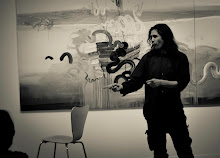One of the aspects of thought that has always fascinated me, is framing. Most actions, most thoughts can be taken up, re-thought, if a new context is made for them, or they are seen in the light of a different or a new problem. Perhaps it is this ambivalence that makes them great art. A great art work, is rich enough that not only many frames are possible, but also that no frame can ever sum up all it has to say - for there is always more. A good frame is then one that sets up a very convincing dialogue with that which it attempts to comprehend. But even this gets the exact relationship wrong. The real relationship should never be comprehend and comprehender, so much as that of a strange exchange that between illicit partners. A work of art solves and posed problems, in the work of thought that is being related to it. It should have the freedom to comment on the ideas, and perhaps strain against them or test them, or mutate them; While at the same time, the body of thought ought to enrich the art work, opening out new facets or even kingdoms within works we are told we know so well.
Such an approach to a work is about as far from the typical 'film' type adaptation, as it is possible to be. All too often, any adaption cuts down the narrative structure, or renders it too simplistic, or attempts to summarise it for a modern audience, with a single image or set of images dominating. As such what is created is all too often pastiche's of the original work, which very seldom challenge an audience, or give them anything new to say. Adaptations are therefore all too often the Google Translated of the thought world. Art is somewhat crudely translated according to modern tastes and fashions, and all the original nuance and meaning are lost. And yet, this is not to knock the substance of adaptations merely its practice. That is translating ideas into the modern idiom is a task of framing, and needs to be done with care, so that the original power of the work, and its own problematising nature, shine through. The result then needs to work at least two levels, the production needs to be cogent in itself, and yet inspire one to look elsewhere, to return to that work it reflects, and changes.
From which it follows, that to perform philosophy ought to be to both adapt a work so its is performable, but also through framing it, allow new angles new aspects of the original to the fore. One needs to be perpetually critical of ones approach, and resist the Scylla and Charybdis of either pastiching the philosopher, or depriving him of the right to say something new something genuinely original. The performance could not work if wither I was mocking the thinker, by giving another (say for example a Freudian) explanation of him though the performance; nor again could it work if I was simply recreating uncritically original philosophy. To perform philosophy is necessarily to frame it, and to frame well is to open up a new approach to a thinker, and allow the audience in. Performance philosophy is in short to explore thought as it is were art; each performance is then a voyage of an endless ocean of possibility, and the audiences needs to feel that fact.


No comments:
Post a Comment